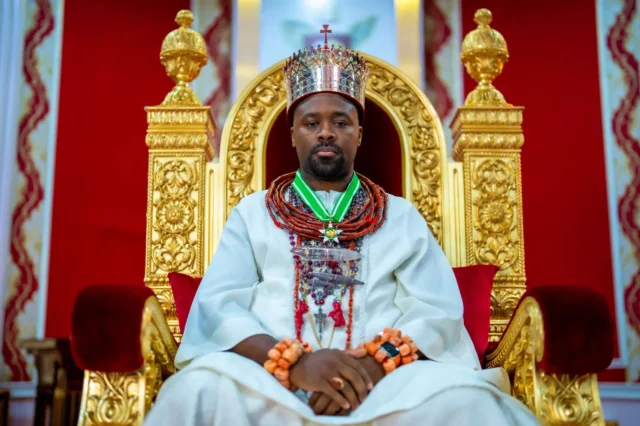The paramount ruler of Itsekiriland and Olu of Warri, His Majesty, Ogiame Atuwatse lll, has promised to give waiver on certain aspects of the Itsekiri tradition to encourage those of the Christian faith to return home to conduct their traditional marriages and burials.
This is even as he placed a ban on the collection of all forms of development fees otherwise known as ‘Deve’ across Itsekiri communities.
The revered traditional ruler who disclosed this in a statement made available to newsmen weekend, also released new requirements and conditions that must be fulfilled by Itsekiris seeking to become chiefs in his kingdom.
The monarch further directed Itsekiris to return home and develop their ancestral communities, noting that burials and traditional marriages should henceforth hold in their various communities.
He stressed the need for Itsekiris to be united and return back to the traditional practice of communal caring for one another, pointing that the cancellation of deve collection will foster rapid development of Itsekiri communities and ensure that his subjects return home to their villages.
He commended the state government for the construction of the Ode Itsekriri bridge, pointing that it would not only ease transportation to and from Ode Itsekriri but also signify a clarion call to the return of Itsekriri to its root.
According to him, “We thank God for all that He is doing for Itsekiri. We thank Him for the favor He is causing us to have with the government of the day. We thank Him for the symbolic victory of the bridge connecting us to our ancestral capital, Ode Itsekiri.
“It is also a symbolic directive, for our people to start returning back to their various homes, especially in the riverine areas.
On Itsekiri burials, the monarch noted, “Everyone knows the usual Itsekiri practice for burials. Thankfully, our burial procedure is not an expensive one. We are encouraging the return to the practice of burying at night in our various villages. Let us bring life
back to our places and stop settling for the easiest and most convenient ways that keep us in this current state of non-development.
“However, it is important to reaffirm, that Ògíamè Atúwàtse II had granted a provision for those of the Christian faith to be buried accordingly. We very much reaffirm this dispensation that was so given. Their families are to be given every support and encouragement as they bring back their loved ones to be buried.
“Also, those who prefer to bury during the daytime, will not be compelled to desist, no one is being
forced or compelled, but we are pointing towards a general direction in which we ought to be going.
“What we expect, going forward, is that unless categorically stated by the deceased before they die, all should be buried back in their home community.
“Where possible, even the reception should also be held there. We should not give excuses as to why
friends and families who live in big cities or other countries won’t want to come. Let them see truly where home is, no matter the state of home, let them see it. And let us be proud of our home, of where our ancestors called home, of where God has given us as our home.
Let us be proud to show it off to the whole world, perhaps that’s the motivation that would make us to be more committed to developing our villages.
“Something of significance should be done at the village, and then, if a different party or reception or thanksgiving wants to be done in the town, that is not a problem.”
Read also: Delta State Nursing Colleges admission to be merit-based, as health commissioner warns against fraudulent agents
On traditional marriages, Olu further instructed that, “In the same way as burials, we want to encourage that when our children intend to marry, something symbolic must be done at the village level. Many of our children in this generation, have never been to their villages.
“The modern world today, is so interconnected. Imagine the exciting adventure it would be, for our children bringing their friends from all over the world, who want to come and celebrate their marriage ceremony with them. And not bringing them to Warri, or Sapele, or Koko, but getting on a boat, and going to the riverine.
“For those willing to embrace this immediately, if their father doesn’t have a home standing in the village,
a canopy in the family compound or idimi would suffice. We can design a brief symbolic activity to
occur, at least for a start, and then they can run back to Warri, Sapele or Koko.
For those not able to do this immediately, the intended couple can take a boat of palliatives, give it to the community, and inform them you are getting married. Let the couple be told the story as to how the community was affected by crisis, or maybe even the history of the community and how it was founded.
“Also, as it was done for burial, Ògíamè Atúwàtse II had granted a dispensation for those of Christian faith, to conduct the traditional marriage ceremony devoid of certain aspects that may not sit well with them. We very much reaffirm this dispensation that was so given. Their families are to be given every
support and encouragement as they bring back their children, friends and family to celebrate with them.
“This gives the next generation, a reason to come home, and at least see their village, and know that they did something significant in their village. And hopefully in time, when their parents have fulfilled the number of their days, they come back to the village again. But hopefully, in between those two
occasions, there could be reasons, or inspiration that comes, and results in the improvement and development of the village.”






